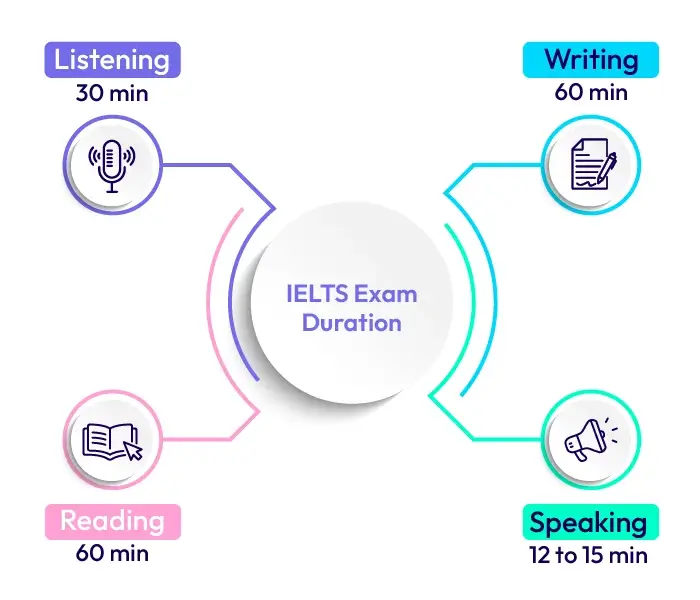Achieve Your Dreams with IELTS:
Your Path to Global Opportunities
Test More, Learn Better, Score High!

Achieve Your Dreams with IELTS: Your Path to Global Opportunities
Test More, Learn Better, Score High!

One of the first and most important steps while applying to study abroad in top study destinations is to make the necessary preparations for the required examinations. This includes a general entrance test like GRE, SAT, LSAT, GMAT or MCAT (which depends on your choice of course) and a language proficiency test like IELTS, TOEFL or PTE.
In this blog, we’re going to uncover everything there is to know about the IELTS exam, including but not limited to the following:
What is the IELTS Exam?
The IELTS (International English Language Testing System) is a type of standardised test that assesses the English language proficiency of a non-native English speaker, who seeks to study, work or migrate to a country where English is the main language of communication.
The IELTS exam is recognised as a valid measure of English proficiency by universities, employers and immigration authorities in various English-speaking countries such as the UK, the USA, Australia, Canada, and New Zealand.
The IELTS exam has 4 parts that measure 4 skills:
|
Skills tested |
Description |
||
|
IELTS Listening |
Contains 4 recordings and a series of questions based on them. |
||
|
IELTS Reading (2 types) |
IELTS Academic Reading |
IELTS General Reading |
Contains passages and questions based on them.
|
|
IELTS Writing (2 types) |
IELTS Academic Writing |
IELTS General Writing |
|
|
IELTS Speaking |
Contains a face-to-face interview with an examiner, including a short Q&A session, a long turn session, and a discussion. |
||
The IELTS test score for each of these parts ranges from 0 to 9, with each of these band scores corresponding to a specified level of competence in the English language. Each of the four skills is scored and then averaged for an overall band score.
Why is the IELTS exam required?
Apart from the most obvious purpose of ensuring an individual has the necessary proficiency to successfully integrate into an English-speaking environment, the IELTS exams also serve other purposes such as the following:
To get access to higher education in an English-speaking country’s universities and colleges, such that you can effectively understand and engage with their academic programs.
To get into certain professions that require a specific level of English proficiency in order to get licensing and registration.
Governments use IELTS scores as a part of their immigration process to assess your ability to mingle with the community and workplace of your desired country.
Employers in English-speaking countries require the IELTS exam score to confirm whether the candidate will be able to communicate efficiently in the workplace.
A high-ranking IELTS score can open opportunities for global education, career advancement and migration.
Types of IELTS Exams
There are 3 types (or versions) of IELTS exams:
IELTS Academic Test
IELTS General Training
IELTS UKVI
IELTS Academic Test
The IELTS Academic test is specifically designed for individuals seeking to pursue higher education or a professional registration in an English-speaking country. This type of IELTS exam evaluates the readiness of the test taker to participate in an academic environment that requires English as a medium of instruction. The reading and writing section of the IELTS Academic test is tailored in such a way that it exposes students to the types of tasks and texts they may encounter in a university setting, such as essay assignments and academic journals.
IELTS General Training
The IELTS General Training test is aimed at people who plan to move to English-speaking countries for jobs, training or high school. It differs from the Academic test which is predominantly for those who want to go to university.
The IELTS General Training test checks how well you can use English in your everyday life, especially at work or in social situations.
IELTS UKVI
The IELTS UKVI (United Kingdom Visas and Immigration) test is a special version of the IELTS exam designed specifically for people who need to prove their English language skills in order to live, work, or study in the United Kingdom. This test meets the requirements set by the UK Visas and Immigration office for visa applications. Although it covers the same skills as the regular IELTS tests such as listening, reading, writing, and speaking, it follows specific rules and security procedures required by the UK government. Whether you take the IELTS Academic test or the IELTS General Training test, the UKVI version ensures your results are accepted for UK visa and immigration purposes.
Modes of IELTS Exams
There are 2 modes in which the IELTS exam can be taken:
IELTS Paper-based: This is the traditional way of taking the IELTS exam, where you write your answers on paper during the listening, reading, and writing sections. The speaking test, however, is conducted face-to-face with an examiner.
IELTS Computer-based: This relatively new mode allows you to take the listening, reading, and writing sections on a computer. The speaking test remains face-to-face with an examiner. The computer-based option offers more test dates and faster result delivery.
IELTS Academic vs. General
|
Feature |
IELTS Academic |
IELTS General Training |
|
Purpose |
For those applying for higher education or professional registration in an English-speaking country. |
For those migrating to English-speaking countries for secondary education, work experience, or training programs, and for visa applications in certain countries. |
|
Content Focus |
Assesses the ability to understand and use complex academic language. |
Focuses on basic survival skills in social and workplace settings. |
|
Reading Section |
Includes three long texts which range from descriptive and factual to discursive and analytical, taken from books, journals, magazines, and newspapers. |
Includes extracts from books, magazines, newspapers, notices, advertisements, company handbooks, and guidelines. These are materials you are likely to encounter on a daily basis in an English-speaking environment. |
|
Writing Section |
Tasks include writing an essay in response to an argument, problem, or diagram, and describing a chart, graph, or diagram. |
Tasks include writing a letter (formal, semi-formal, or informal) and writing an essay in response to an argument or problem (the essay can be slightly more personal in style than the Academic essay). |
|
Difficulty Level |
Considered to be more challenging due to the level of academic language tested. |
Focused more on everyday English skills, making it less challenging for those accustomed to using English in daily life. |
IELTS Exam Eligibility
The best thing about IELTS exams is that there are no strict eligibility requirements. This makes it a very accessible test to all, regardless of age, gender, nationality, or background.
Note, however, that the primary intention of the exam is to test individuals planning to study, work or migrate to an English-speaking country. As a result, it is generally recommended for candidates who are at least 16 years old, even though there is no official minimum age requirement.
Beyond this, the main requirement for taking the IELTS exam is a valid passport to serve as your identification on the day of the test. The choice between taking up the Academic or General Training version depends on your specific goals; whether you’re pursuing higher education, professional registration or immigration.
IELTS Exam Fees for Indian Students
The IELTS exam fees can vary slightly depending on the test centre you go to.
However, here are the approximate costs in INR for each test type:
|
Test Type |
Cost (INR) |
|
Computer-delivered IELTS for UKVI |
INR 17250 |
|
Computer-delivered IELTS Academic |
INR 17000 |
|
IELTS Life Skills (A1 and B1) |
INR 16,050 |
|
IELTS for UK Visas and Immigration |
INR 17250 |
|
Pen and paper-based IELTS |
INR 17000 |
IELTS Exam Duration
Here’s a rundown of how long each part of the IELTS exam takes:
Listening - 30 minutes
Reading - 60 minutes
Writing - 60 minutes
Speaking (scheduled separately) - Depends (but on average, 12-15 minutes)
Total duration of the exam: Approximately 2 hours and 45 minutes, without including the speaking test, which is scheduled separately.

How to Book a Slot for the IELTS Exam?
Booking for the IELTS exam involves a straightforward process that can be completed either online or offline.
Here’s how you can do it:
IELTS Online Registration
Visit the official IELTS website
Select the test type
Choose a test date and location
Fill out the application form
Upload identification document
Pay the test fee
Confirm your registration
IELTS Offline Registration
Download/obtain the application form
Complete the application form
Choose your test date and location
Provide identification document
Pay the test fee
Submit your application
Await confirmation on the date and venue
How to Check IELTS Results?
Your IELTS result, also known as your Test Report Form (TRF) can be checked in a straightforward method, in 2 ways:
Online
Visit the official IELTS website
Log in and enter personal details, identification document number and candidate number
View your results online (after 13 days if it’s a paper-based test, and 3-5 days if it’s a computer-based test) and download your scores
Test centre/Postal mail
Your physical TRF will be mailed to you 13 days after the test
Some test centres may allow you to pick it up in person with proper identification
If you have requested your results to be sent directly to institutions (e.g., universities, immigration offices), they will also receive your TRF around the same time
While we are on the topic of IELTS results, make note of the following too:
Your IELTS score is typically valid for two years.
You can request the test centre to send additional copies of your TRF to institutions within these two years, possibly for a fee.
Physical TRFs have security features to prevent fraud, so handling and sharing them carefully is important.
Where are IELTS Exam Centres Available in India?
IELTS exam centres are available across major cities and towns in India.
Here's a list of some key locations where IELTS exam centres can be found:
Ahmedabad
Amritsar
Bangalore
Bhopal
Bhubaneswar
Chandigarh
Chennai
Coimbatore
Delhi
Hyderabad
Jaipur
Jalandhar
Kolkata
Lucknow
Ludhiana
Mumbai
Nagpur
Patna
Pune
Rajkot
Surat
Thiruvananthapuram
Vadodara
Visakhapatnam
Are you ready to pursue your higher education abroad? If you are, now is the right time to start preparing for your IELTS exams.
Don’t worry, all of the extensive information you just read shouldn’t scare you – on the contrary, it’s gonna make the next steps you’ll be taking much easier. Have more questions or need help in test preparation? AECC is just a call away, reach out to us today!

